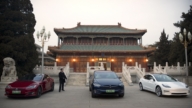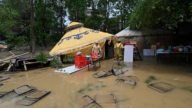【新唐人2014年12月29日訊】中共人大常委會日前審議了「境外非政府組織管理法」草案,準備將境外非政府組織(NGO)納入法律管控範疇,對這些組織的各項活動加強管理。這對於在華發展不易的境外非政府組織來說,似乎添加了一記沉重打擊。有中國問題專家表示,這些境外非政府組織的操作獨立於中共,因此才會讓中共感到恐慌。
中共喉舌《新華網》22號報導,為規範境外非政府組織在中國境內的活動,中共國務院提請人大常委會審議「境外非政府組織管理法」草案。
中共公安部高官說,近年來境外非政府組織來中國境內,開展公益活動日益頻繁,為了加強管理有必要制定相關管理法。法案明確了境外非政府組織,在中國境內設立機構和開展活動,必須申請登記許可程序,違反規定需要承擔相關法律責任。
12月26號,香港《明報》引述獨立消息來源透露,這次法案規定,境外非政府組織的活動,除在民政部登記外,還需得到相關行業主管部門許可﹔另外,境外非政府組織可能會被禁止從事政治、宗教等活動。
中國非政府組織「益仁平中心」負責人陸軍披露,當局沒有制定相關法案之前,對境內和境外的非政府組織,已經進行過多次全面清查。
中國非政府組織「益仁平中心」負責人陸軍:「比較典型的就是05、06年東亞和東歐顏色革命之後,應該說通過那幾年政府的調查,包括非常緊密的監控,政府也明白了,公益組織它的國際合作是一個大趨勢,是不可逆轉的,同時它也搞明白了非政府組織它不是一個政治力量,尤其他不是破壞性的力量,是一個建設性的力量。」
陸軍表示,人大制定的相關法案,如果是對「境外非政府組織」的嚴控,那就太外行了,因為一個社會必須靠「政府系統」、「商業系統」和非政府組織的「公益系統」這三大系統相輔相承,才能健康正常地運轉。
《六四天網》負責人黃琦說,多年來,由於當局的管制和打壓,資金的來源艱難,人才缺乏等諸多問題,一直限制著境外非政府組織在中國的發展。
黃琦:「在中國大陸,共產黨作為執政黨,它已經執政60多年,它是不允許任何地區組織各種活動的,除了共青團,政府建的工會,以及所謂的八個民主黨派之外,嚴格說,對於這些境外的非政府組織當局是很不放心的。」
早在2006年8月,中共官媒就對中國的境外非政府組織總結了4條所謂的威脅性:1、是危害國家安全﹔2、是破壞中共政治穩定﹔3、助長腐敗﹔4、在中國推行外來模式。
今年6月,中共就曾對境外非政府組織進行大規模的摸底調查。國安委要求「不留死角」的對在當地開展活動的社會團體、基金會、民辦非企業單位等非政府、非營利組織,進行深入排查。
中國問題專家李善鑒指出,在民主國家,普通公民都能成立自己的社區和獨立團體,但是這種模式搬到中國,就受到種種限制。這不是說它的操作有問題,而是它的操作獨立於中共的控制之外,讓中共感到威脅。
中國問題專家李善鑒:「這些境外的非營利組織,它在國內有分支機構去做一些事情,其實這個對中共來講,它會認為這是對它的一個威脅,因為這些組織不能夠被它像國內的組織那樣,那麼好直接去控制。」
李善鑒表示,中共的政府機構以及大學、研究機構,早年沒少從境外組織獲取各種資助,但隨著大陸群體事件逐年暴增,以及各國相繼發生的「顏色革命」,近年來中共不僅對境外組織,對國內的民營企業、組織也都越來越不放心。
採訪編輯/李韻
New Law to Regulate Foreign NGOs in China
A draft bill regulating foreign non-government organizations
(NGOs) is being discussed by the Communist regime.
The purpose is to regulate the activities
of these organizations in China.
It is quite a heavy blow to the already struggling
NGOs in China today.
Experts believe the independence of NGOs
in China is what threatens the regime.
The Communist mouthpiece, Xinhua News Agency,
reported on Dec. 22 that a draft bill introduced
by the State Council regulating NGOs based outside
the Chinese mainland was submitted to the National
People’s Congress Standing Committee.
According to the deputy public security minister,
it is necessary to have a law regulate the ever increasing
NGO activity in China.
Overseas NGOs will have to register with and be approved
by Chinese authorities if they want to set up representative
offices or temporarily operate programs in the mainland.
Relevant laws are also described in the bill.
Hong Kong’s Ming Pao Daily News quoted independent
sources on Dec. 26 who said that the bill states that NGO
activity must be registered to Civil Affairs and receive
permit(s) from relevant authorities;
foreign NGO may be prohibited from engaging
in activities related to politics and religions.
Chinese NGO “Beijing Yirenping Center" director Lu Jun
indicated that the regime has conducted several
comprehensive investigations of both
domestic and foreign NGOs.
Lu Jun: “Especially after the color revolution in East Asia
and Eastern Europe during 2005 and 2006,
the government very closely monitored NGOs.
The government understood then international
cooperation is an irreversible trend.
It also realized the NGO is not a political force
or destructive force but a constructive force."
Lu Jun points out any bill regarding strict control
of the NGO would be out of latitude.
He believes that a healthy and normal society relies
on complementary relations between the government,
business and NGOs.
64tianwang.com director Huang Qi explains that
development of foreign NGOs in China has always been
limited due to lack of funding sources and professionals
after the years of control and suppression by the regime.
Huang Qi: “In China, as the ruling party for more than
60 years, the Communist Party never allowed any
organization of activities other than the Communist Youth
League, the State union, and the so-called eight
democratic parties.
Strictly speaking, the CCP is very uneasy
about foreign NGOs."
Back in Aug. 2006, CCP media summarized
four threats from foreign NGOs:
One, they endanger national security;
Two, they destruct CCP’s political stability;
Three, they fuel corruption;
Four, they promote foreign modes in China.
This June, the CPC has conducted a massive and thorough
investigation into foreign NGOs.
The Central National Security Commission demanded
a thorough investigation of all NGOs and non-profit
organizations, including local communities, foundations
and private non-enterprise units.
China issue expert Li Shanjian indicates that as ordinary as
local communities and groups are in democratic countries,
they can be subject to all sorts of limitation in China.
It is not the operation that’s being questioned,
but the independence.
They are outside of the CCP’s control,
and they threaten the CCP.
Li Shanjian: “These foreign NGOs would set up branches
in China to do things.
But the CCP considers these NGOs threats because they are
not so easy to control like those domestic organizations."
Li Shanjian explains that the Central government
and agencies, universities and research institutes
have all benefited from the aid from many of these NGOs.
But, the surging domestic mass incidents and the color
revolutions in various countries have the CCP worried
and uneasy about the foreign NGOs as well as its domestic
private enterprises and organizations.
Interview & Edit/LiYun



























